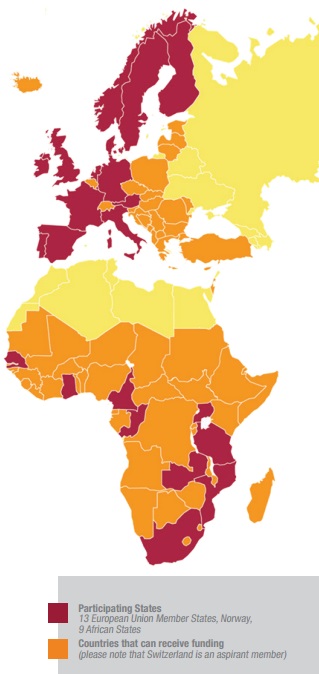Q: Now in its 11th year, what has EDCTP achieved and what’s ahead next for the partnership?
The first phase of EDCTP has been a success in many ways. Simply, its establishment is an achievement in and of itself. As a result of the approximately
100 clinical trials EDCTP has supported so far, it has succeeded in finding eight improved medical treatments. Additionally, it has improved research
capacity in sub-Saharan Africa. One intangible achievement of the program is to demonstrate the importance that EU policymakers have placed on supporting
investment into innovative global health activities.
What the last eleven years and what the next program hopes to achieve is to demonstrate that investment in global health R&D can have a direct impact
on the health of people living in low- and middle-income countries. New medical interventions—like, for example, vaccines for malaria and HIV and AIDS
or more effective and accessible contraceptives—can be utilized to lift a burden of diseases that stifle economic growth and prevent young men
and women from reaching their full potential—physically, economically, and socially.
Practically speaking, for EDCTP’s second phase starting in 2014, it aims to be even more ambitious. The budget has been nearly tripled, and a number of
African countries graduated to full membership status—giving them equal powers in EDCTP’s general assembly. Furthermore, the scope of EDCTP will
expand to cover NTDs, as well as Phase I and IV clinical trials. EDCTP2 is expected
to have an even stronger coordinating role in national research programs and to succeed in bringing together large funds also from third parties to
run resource intensive Phase III clinical trials.
Q: What are the most exciting results, news, or outcomes that came out of this year’s forum?
The forum gathered 320 participants from 42 different countries. An overall majority of these participants were young and confident African researchers
who presented the tremendous research they have conducted in EDCTP-funded projects in the past several years.
New interventions that have been incubated with the support of EDCTP were also showcased at the forum. Among these scientific achievements were:
- the identification of a new treatment regimen that may significantly shorten the duration of TB therapy;
- the successful Phase II trial of an HIV vaccine in Kenya;
- and, the conduction of first studies of controlled human malaria infection (CHMI) in African populations.
What these innovations show is that investment in global health R&D can have real and potentially immediate returns on donor and private sector investment—developing
treatments that are needed now for young men and women living in some the world’s poorest countries.
The forum also succeeded in bringing together major funders of global health R&D such as the Bill & Melinda Gates Foundation, the Wellcome Trust,
the German Ministry for Research and Education, and the Research Council of Norway. In the context of the partners’ session, DSW was delighted to have been given the opportunity to present its collaboration with EDCTP.
DSW—in its mission to support increased funding for research into HIV and AIDS, TB , and malaria—has been a long standing
advocate for EDCTP’s mission. As part of this support, we followed the formal session of the forum with a dedicated roundtable event on the benefits of EDCTP in the German parliament.
At this event, we stressed the importance of a so-called political “buy-in” to the EDCTP process and the broader international fight against poverty-related
and neglected diseases. Hopefully, the German members of Parliament in attendance left the meeting with a clear message to bring to their government
colleagues: European governments need to step up their financial support and match the EU’s efforts in global health!


